When I was at the skillshare workshop in Akwanga the other week, Tracey was talking about a trip down to the South-South she had been planning and said she was looking for people to join her. A few weeks later Tracey, Jenny and I met up in Abuja to start the two-day journey to Akassa.
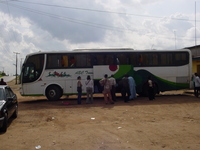 We took the ABC Transport coach to Port Harcourt, much more comfortable than the bush taxis we normally use. The coaches are the same ones most of the companies in Chile used, made in Brazil by Marcopolo, with air conditioning and reclining seats. They even served us a meal on board and showed videos recorded from satellite TV.
We took the ABC Transport coach to Port Harcourt, much more comfortable than the bush taxis we normally use. The coaches are the same ones most of the companies in Chile used, made in Brazil by Marcopolo, with air conditioning and reclining seats. They even served us a meal on board and showed videos recorded from satellite TV.
(more…)
My colleague Tayo got married to his girlfriend Bisi at the weekend and I was invited to Akure to attend both the traditional engagement and the reception the next day.
One of the staff buses from FRCN picked us up outside Radio House on Friday morning and we all piled in for the (roughly) six-hour journey down to Akure, in Ondo state. The bus was much more comfortable than public transport, we had a seat each and it didn’t get too hot. We even stopped for a while at Lokoja, so I managed to get some fried yam and akara for lunch.
We arrived just in time to get changed into Nigerian traditional dress and walk over to the engagement ceremony with Tayo (the pictures were all taken by Jonah):
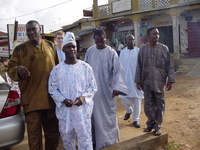
(more…)
I went for a walk last week, to try to get some pictures of Abuja. It’s a weird city, lots of big concrete buildings but also large areas of undeveloped land. In this picture you can see a view across one of these areas towards (from left) Le Meridien hotel, the International Conference Centre and Radio House.
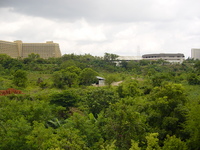
Many of the undeveloped plots are being used to grow crops, or have illegal buildings on them. The Federal Capital Development Agency is currently trying to rid the city of these illegal buildings, with a series of demolitions.
Some of the buildings in Abuja have been in progress for some time, such as the National Ecumenical Centre. Many seem to have been abandoned for a while.
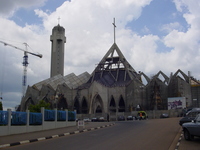
When I have a free weekend (not for a while) I’ll go for another walk and take more pictures. It’s not an unattractive city, but very short on any kind of excitement.
The College of Education in Akwanga has three VSOs working there, I’ve visited them before. Sue had organised a two-day workshop for the education volunteers and their counterparts (the Nigerians they work with) to share skills and experiences. I was invited along to provide IT support, producing a CD with all the documents that people had brought along.
Accomodation had been organised for us at the Roma Z guest house in Akwanga and we even had our own armed guard from the (in)famous Mobile Police (Mopol). Tracey did an excellent job of chasing up the staff at Roma Z to make sure everything was OK, especially the water supply.
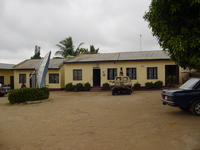
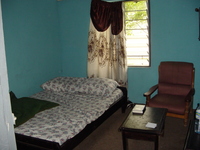
(more…)
[Requested by Catherine]
0730 Alarm goes off. Get up, shower, dress, make porridge and Milo (using powdered milk) for breakfast. Pour last night’s boiled water into the filter and start boiling some more (using the kettle to get it up to boiling and then ten minutes on the stove to kill the beasties). Fill up plastic bottles with filtered water. Dump the food waste bin contents in the heap at the other end of the compound.
0855 Leave the house and wander over to the office, greeting security guards along the way. Get to office, greet Jonah, Tayo and anyone else who’s around. Plug in the laptop and check email. Research software and hardware needed for various projects, provide advice on technical issues, attend meetings.
1230 Wander back to the house for lunch. Once a week or so go to one of the chop houses at Radio House instead.
1315 Switch on the pump to move water from the bottom tank to the roof tank. Stand by the switch and wait for the tank to overflow, switch off the pump (there’s no other way of telling when the tank is full).
1330 Wander back to the office. Doing the same things as before lunch. Go up to the twelfth floor (location of the newsroom and studios), which involves queueing for some time waiting for whichever of the four lifts are working today.
1730 Pack up laptop, leave the office, walk back to the house. Cook dinner (or do the dishes if it was Marebec’s turn to cook). Pour the morning’s water into the filter, boil more water. Listen to the radio, read, watch TV.
2200 Go to bed. Bedtime is earlier if there is no light.
Of course the times and what I do vary from day to day but that would be a fairly typical day.
I’ve added an illustrated glossary so that when you encounter a Nigerian word like okada you can find out what I’m talking about.
Admittedly there’s only one illustration so far, but I’m planning to go round taking some photos of everyday things soon.
While I was in Kabba I bought some fabric and once I was back in Abuja I took it to my tailor to get some trousers made, here’s the result:
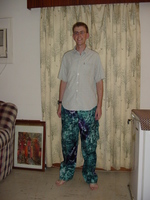
One of the things that makes life in Nigeria more interesting is the process of ordering food at one of the many chop houses (informal-economy restaurants). You usually end up playing a guessing game that’s oddly reminiscent of the Monty Python Cheese Shop sketch.
The main rule of the game seems to be that the waiter/waitress must never reveal what food they actually have except in answer to a specific question. So, for example, asking “what food do you have?” won’t work. Instead you have to ask about each individual item that may or may not be available: pounded yam, rice, stew, egussi soup, white soup, garri, semovita, draw soup, …
A second rule is that most things should be off or that they should have just run out.
There’s a slight variation of this game played in the fast food restaurants of Abuja. These look like normal Western fast food places and have a large illuminated menu. Of course, most of the things on the menu are either never available or are not available right now. The staff won’t tell you what’s not available or list what is, instead you have to keep guessing until you find something they actually have.
I’ve been meaning to do some baking for a while. The bread here isn’t great, far too sweet and suspiciously yellow.
It took me a while to assemble the bits and pieces I need, loaf tins in particular seem to be very difficult to buy here. Then I had to summon up the enthusiasm and spare time for baking.
Yesterday afternoon I finally got round to it.
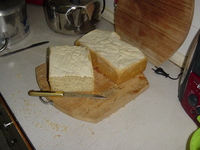
The end result was surprisingly good, especially considering that our oven doesn’t have any temperature settings (there is a little bit of variation in between on and off but not much). The tins are a bit of an odd shape but the bread had a nice crispy crust and a soft inside without huge air bubbles. It’s much harder work mixing up the dough without a mixer, so this morning I have aching shoulders.
Now we just need to get something to put on the bread…
The recent lack of updates and email has been due to the internet connection at work getting less and less reliable until on Friday it gave up completely. It seems to be OK today, so I’m catching up.
This weekend I joined a large group of other VSOs and employees of various other organisations for a trip to Kabba, Kogi state.
We left work on Friday at lunchtime. The journey takes over three hours, the road from Abuja to Lokoja is known for accidents and the road from Lokoja to Kabba for potholes and armed robbers. Luckily Marebec and I had managed to cadge a lift with Ronan and some others in an air-conditioned LandCruiser, much more comfortable than public transport!
As you travel south from Abuja the landscape gets noticeably greener and just before Lokoja you cross the Niger river:
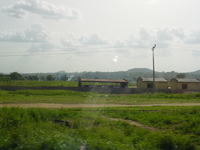
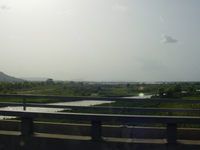
The purpose of the trip was to visit Fathers Noel and Leo, both missionaries in Kabba. They were having a party to celebrate Leo’s birthday at the centre where they both work. Here’s a picture of the Diocesan Pastoral Centre and another of the house containing the infamous Hillie’s Bar.
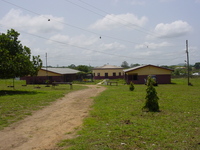
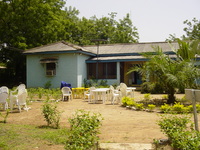
(more…)
 We took the ABC Transport coach to Port Harcourt, much more comfortable than the bush taxis we normally use. The coaches are the same ones most of the companies in Chile used, made in Brazil by Marcopolo, with air conditioning and reclining seats. They even served us a meal on board and showed videos recorded from satellite TV.
We took the ABC Transport coach to Port Harcourt, much more comfortable than the bush taxis we normally use. The coaches are the same ones most of the companies in Chile used, made in Brazil by Marcopolo, with air conditioning and reclining seats. They even served us a meal on board and showed videos recorded from satellite TV.![[Nigeria]](/media/Flags/NGflagSmall.png)










